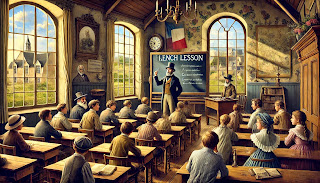By Alphonse Daudet
Short Answer Type Questions
1. Why was Franz reluctant to go to school that day?
Answer: Franz was reluctant to go to school because he hadn’t prepared his lesson on participles, fearing scolding from his teacher. Additionally, the warm weather, the chirping of birds, and the sight of Prussian soldiers drilling outdoors tempted him to stay away.
2. Imagine you are Franz. Write two sentences expressing your emotions after hearing the last lesson announcement.
Answer: "I was overcome with regret and guilt for not valuing my French lessons. The thought that I would never hear Monsieur Hamel’s teaching again made me realize how precious the language was."
3. What does the villagers' presence in the classroom signify, and how can this situation apply to our appreciation of culture and language today?
Answer: The villagers' presence signifies their regret for neglecting their native language and their desire to honor it. This reflects the need to preserve linguistic heritage, especially in a globalized world where native languages are often overshadowed by dominant ones.
4. Do you think Monsieur Hamel's method of teaching the last lesson was effective? Why or why not?
Answer: Yes, Monsieur Hamel’s method was effective because he combined emotional appeal with a sense of urgency, making students and villagers reflect on their neglect of the French language. His sincerity and passion left a lasting impression.
5. Analyze the impact of the loss of language on the identity of a community as illustrated in the chapter.
Answer: The chapter demonstrates that language is intrinsic to a community’s identity. Losing the right to learn French threatened the villagers' cultural heritage, history, and connection to their land, creating a sense of loss and alienation.
6. What can be inferred about Franz’s character development through the story?
Answer: Franz evolves from a carefree and indifferent student to someone deeply remorseful and appreciative of his language and culture. His growing respect for Monsieur Hamel reflects his emotional and intellectual maturity.
7. What does the message on the blackboard, "Vive La France," symbolize in the context of the story?
Answer: "Vive La France" symbolizes patriotism and resistance against oppression. It reflects a collective yearning to preserve cultural identity and pride in being French, even under foreign rule.
8. Write a brief dialogue exchange between Franz and Monsieur Hamel reflecting their feelings at the end of the last lesson.
Answer:
Franz: "Monsieur, I’m sorry for not paying attention before. I didn’t realize how important French is to us."
Monsieur Hamel: "Franz, it’s never too late to love and honor your heritage. Carry our language in your heart."
9. At the end of his last lesson, M. Hamel decides to leave a little note for each of his students for them to find the next day at their desks. Based on your reading of the story, what might his note to Franz read?
Answer: M. Hamel's note to Franz might read:
Dear Franz,
remember that language is the soul of a nation. Cherish your heritage and embrace learning. You have the potential to achieve greatness. Though I leave, my hopes for your future remain. Keep striving and never forget your roots.
Yours,
M. Hamel.
Long Answer Type Questions
1. How does the chapter "The Last Lesson" emphasize the importance of valuing one’s language and culture? Relate this lesson to the modern context of globalization and cultural assimilation.
Answer:
The chapter underscores the significance of language as a cornerstone of cultural identity. Monsieur Hamel’s last lesson serves as a poignant reminder that neglecting one’s language can lead to a loss of cultural heritage and historical continuity. The regret felt by Franz and the villagers highlights the irreversible damage caused by indifference.
In today’s era of globalization, similar challenges arise as dominant languages like English overshadow native tongues. Cultural assimilation and migration often result in younger generations losing touch with their linguistic roots. For instance, indigenous languages around the world face extinction as communities adopt mainstream languages for economic reasons.
To address this, there is a growing need for educational policies that promote bilingualism and cultural diversity. Language preservation initiatives and increased awareness among youth can ensure that globalization does not erode linguistic heritage but enriches it.
2. Evaluate the role of education in shaping national identity as depicted in "The Last Lesson." How can students today contribute to preserving their cultural roots while embracing modern advancements?
Answer:
In "The Last Lesson," education is portrayed as a vital tool for fostering national pride and cultural identity. Monsieur Hamel’s lessons were more than grammar exercises—they were lessons in heritage, resilience, and the power of language in uniting people. The villagers’ regret for ignoring education underscores its role in safeguarding national identity.
In today’s interconnected world, students face the dual responsibility of embracing global advancements while preserving their cultural roots. Participating in cultural events, learning traditional art forms, and studying regional history can nurture a sense of belonging. Schools can play a pivotal role by incorporating local literature and languages into curricula.
Furthermore, technology can aid in preservation through digital archives, language-learning apps, and virtual cultural tours. Students can become cultural ambassadors, promoting their heritage through social media and creative projects. Balancing tradition with innovation ensures that cultural identities remain intact in an ever-changing world.

No comments:
Post a Comment